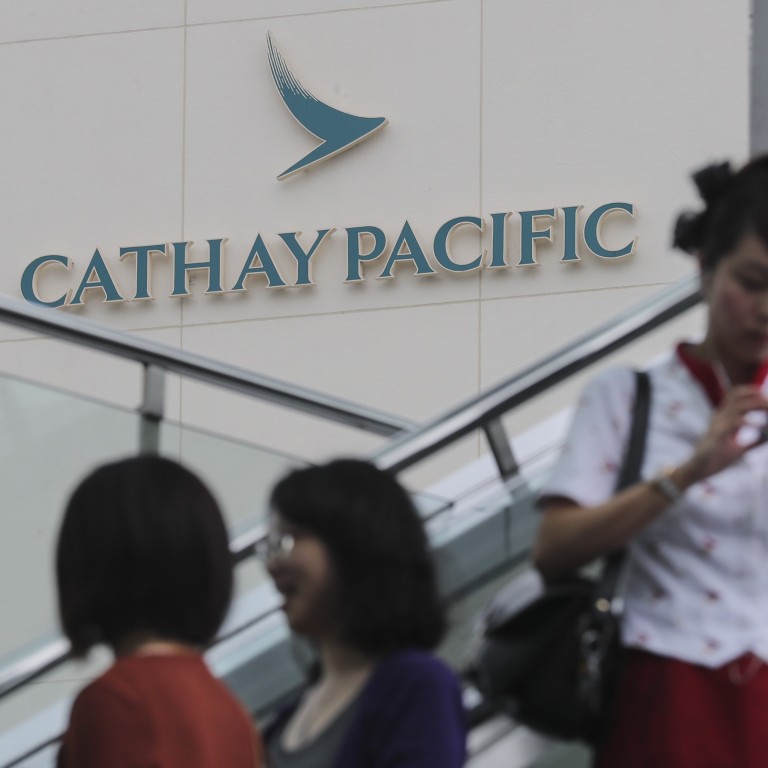
Cathay Pacific cuts pay rises for staff to 2 per cent, gives one-off sum of up to US$3,800 in place of year-end bonuses
- Cathay will give the bulk of its 27,000 staff a year-end payment of HK$30,000, or one month’s salary, whichever is lower, the CEO says
- The reduced end-of-year payments come as the city’s flagship airline reels from the impact of Hong Kong’s anti-government protests
The bulk of the company’s 27,000 airline staff will receive a year-end payment of HK$30,000 (US$3,800), or one month’s salary, whichever is lower, CEO Augustus Tang Kin-wing announced in a memo to staff.
“I recognise the disappointment of not being paid a Discretionary Year-End Bonus and hope the ex-gratia payment represents a token of our goodwill and appreciation,” Tang said. “I know people are pulling together and supporting each other through what has been a very turbulent period.”
Staff will next year receive a pay rise of 2 per cent, down from the wage increases of between 3 and 8 per cent paid to some 14,600 workers last year. Hong Kong’s rate of inflation stood at 3.1 per cent in October.

Cathay Pacific, fresh from issuing two profit warnings, plans to fly fewer flights as demand for its flights wanes due to the impact of the civil unrest in Hong Kong, which was triggered six months ago by the now-withdrawn extradition bill.
The airline’s Flight Attendants Union, which has members who found out they no longer had jobs after posting social media message in support of the anti-government protests, said it accepted the lower-than-expected annual settlement.
Tang said last week no more routes would be cut outright, but that the company would unveil cost control measures, aiming to be “proportionate to the challenges we face”.
No relief measures for airlines at Hong Kong airport despite protests
As the airline faces the reality of a more challenging 2020, it has adjusted the number of planes it will operate next year, taking a total of 17, slowing the delivery of newer aircraft and accelerating the retirement of older planes.
Between August and October, total passenger traffic at Hong Kong’s airport had fallen 2.3 million compared with the same period last year. Cathay flew 770,000 fewer people year on year during the same period. Annually, the airline flew 35.4 million people last year.
Earlier this month, the airline issued its second profit warning in less than a month, saying profits would be “significantly below” its performance in the first half of the year – when it earned HK$1.34 billion.
Last year, the airline reported a HK$2.34 billion profit, its first annually in three years following two years of losses.
Cathay not planning to ground planes or offer unpaid leave amid protest woes
With more positive profit sentiment last year, the airline awarded a one-month discretionary bonus, and separately, pay rises of between 3 and 8 per cent benefiting 14,600 staff, excluding pilots, which it was locked in a deepening industrial dispute at the time. Cathay Dragon cabin crew were also excluded.
The Cathay Pacific Group include its flagship long-haul namesake airline, regionally-focused Cathay Dragon, budget unit HK Express and all-cargo carrier Air Hong Kong among its major brands.
The company was censured by mainland China’s aviation authority in August, prompting a boycott from Chinese travellers in a market that makes up some 20 per cent of its daily flights. The criticism by the Civil Aviation Administration of China also triggered the resignation of Rupert Hogg as CEO and his deputy Paul Loo Kar-pui.

